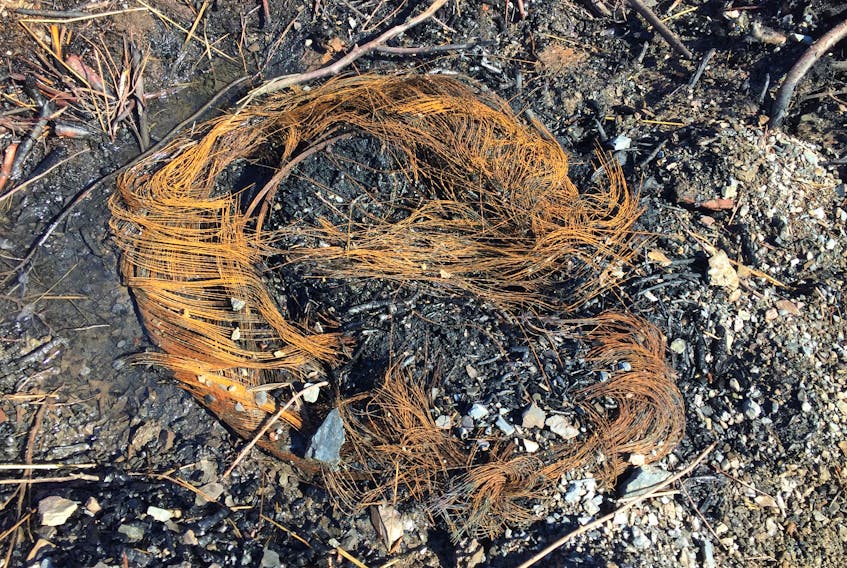I cleaned up the rusting steel belts, but there was nothing I could do about the real pollution.

The belts were really little more than unsightly trash. The real problem was what had come belching out of the burning tires and into the air, along with the oil that had been rendered out of the black rubber and had seeped into the ground before it had a chance to burn.
Some time over the winter or in the early spring, a decision was made to clear brush off the shoulders of the ATV trail that wends north of Carbonear along part of the old railway line.
I understand why the clearing happened: the alders were doing what the alders do, living on the margin and working their way in. Last summer, they’d narrowed the trail enough that the branch tips were reaching in far enough to rub the ATVs on both sides — meet someone going in the opposite directions, and neither the walkers (like me) nor the ATV drivers had any space to pass.
So a section of the trail was cleared right back to the ditches alongside the old rail ballast stone — and some acquaintances of mine were lost in the process.
I love the way the man-made gets overtaken by nature. Along the rail bed over the last eight years or so, I’ve watched the single-petalled pink roses roll across the ditch and up into the verges of the trail, and the way those roses seem to open atop everything they intertwine with, laying there like a delicate and ornate cape. There were collectives of opportunistic and thorny blackberry, ready to produce a late-season burst of purple flavour on your tongue, and prolific wild raspberries as well.
There will still be roses and raspberries and blackberries, just not where they have been, growing more prolific every summer. Instead, there are the sharp stumps of where the brush used to be, stumps that may yet fight their way back.
Some things about the brush cutting were obvious: the people doing the clearing liked having beer when they stopped cutting brush and started burning it — tallboy cans of Maximum Ice, to be precise, the empties tossed off the trail into the woods.
And something else that was obvious? They lighted almost every pile of brush by burning a tire.
In some places, it was an ATV tire. In others, a full-sized automotive steel-belted radial.
It’s probably just the way it’s always been done — a simple way to have a hot, quick fire to get rid of piles of slash.
But even if you have to burn the slash to get rid of it (something that isn’t the best of options anyway), was it really necessary to burn 20 or more tires, too?
I sometimes think that the cheapest way to make environmental advances is also, strangely, one of the most difficult: learning different ways of thinking about what we do.
But, even if you have to burn the slash to get rid of it (something that isn’t the best of options anyway), was it really necessary to burn 20 or more tires too?
The federal government is looking at a ban on single-use plastics, in the process, requiring companies that use the plastic to pay for the costs of recovering and reusing the materials. It’s a way to keep plastics out of rivers and oceans, where they are a growing hazard to marine life. But forgotten in all of this is that every piece of plastic that’s manufactured has to get to where it ends up by travelling there at the hands of a human.
Almost the very day that the federal Liberals announced they were looking at a single-use plastics ban, opposition sprouted, citing the single uses where plastic isn’t easily replaced: hospital equipment like syringes and tubing, plastic straws needed by people with certain disabilities. There were any number of legitimate arguments about exceptions, none of which looked at the fact that this is a problem we’ve made and have steadily refused to address. Plastics aren’t in rivers and oceans because we happen to have plastics; they are in rivers and oceans because we put them there.
Bans are the hard-core way to dealing with things that people won’t do on their own.
And people? Well, it’s incredibly difficult to change what they’re offhandedly used to doing.
If I live another 25 years and automobile tires are still around, I imagine I’ll still find their threadlike, rusted wires poking out of blackened branches.
Maybe, just maybe, the problem is us.
Russell Wangersky’s column appears in 36 SaltWire newspapers and websites in Atlantic Canada. He can be reached at [email protected] — Twitter: @wangersky.
MORE FROM RUSSELL WANGERSKY








